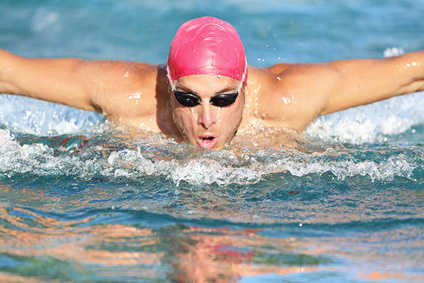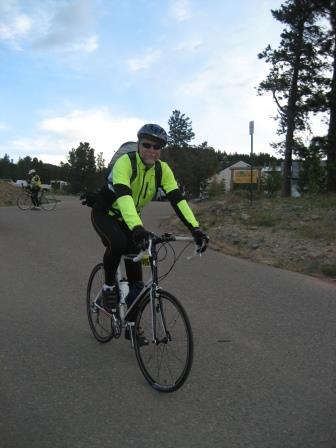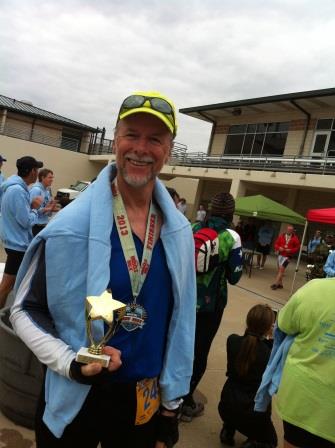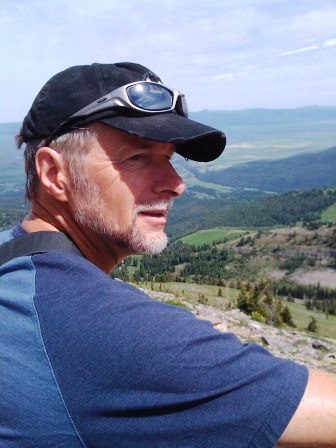The Magic of Your Subconscious Mind
 I am lining up at the natatorium to start my 250-meter swim, which is the beginning of a so-called sprint-triathlon in our hometown. I am towards the end of the line, start number 245, in between an older gentleman and a younger lady of Asian descent. Having to wait in line for at least one hour, we ended up being very nice conversation partners. After my hike to the 19,200 ft. summit of Kilimanjaro just a month prior to this event, which gave the saying that “the sky is the limit” has a totally new meaning, I feel that this is going to be easy. I am sure I’ll have enough oxygen to do this swim, the 13-mile bike ride and 3 mile run. My start position was based on the time specified for the swim and the total time I entered when I registered. My previous race time was 1:42:00, so to challenge myself, I wrote down 1:39:00 as my estimated finish time. This is where the power of the subconscious mind comes in, but about that later.
I am lining up at the natatorium to start my 250-meter swim, which is the beginning of a so-called sprint-triathlon in our hometown. I am towards the end of the line, start number 245, in between an older gentleman and a younger lady of Asian descent. Having to wait in line for at least one hour, we ended up being very nice conversation partners. After my hike to the 19,200 ft. summit of Kilimanjaro just a month prior to this event, which gave the saying that “the sky is the limit” has a totally new meaning, I feel that this is going to be easy. I am sure I’ll have enough oxygen to do this swim, the 13-mile bike ride and 3 mile run. My start position was based on the time specified for the swim and the total time I entered when I registered. My previous race time was 1:42:00, so to challenge myself, I wrote down 1:39:00 as my estimated finish time. This is where the power of the subconscious mind comes in, but about that later.
After about 30 minutes I am finally at the front of the line and ready to jump in the pool, having admired all those athletes who seemingly cruise through the water effortlessly. This race is by invitation only, it is for those that finish in the top of their age categories in local races over the past two years, so these are the “semi-elite” athletes. The only reason I was invited was because in a prior race there were only two participants in my age group, which automatically placed me second and gave me a trophy. This brings me to an important point. I don’t understand why people stop exercising when they get older. For most people, the first major departure from sport activities is after high school, the second one is after college, and then as soon one gets to be 40, 50, or older, most people just stop exercising. I can’t imagine that everyone has bad knees, hips or other disabilities that prevent them from actively performing any sport. I must believe that it is either laziness or lack of interest, or indifference to their fitness level and related health.
After jumping into the cold water, I am doing my best to make a good time, but my goggles keep filling up with water, and after trying to adjust them a few times, I give up and just take them off and swim without them. Several other swimmers pass me; however, I am able to pass number 244 in the last 25 yards, which boosts my self-esteem. I climb out of the pool, run to the transition area to grab my bike, and after putting my shirt and helmet on as well as sunglasses and gloves, I slip into my bike shoes, and I am on my way. The beginning of the bike race is relatively slow; I am looking at my speedometer and can’t seem to make more than 17 mph. After about 100 yards I am passed by another biker who seems to be going almost twice as fast, and this is repeated another two times over the next few hundred yards by others passing me. Not very motivating I must say. Eventually, I begin to make good progress, climbing up several hills and even passing one or two other racers. After the turnaround, I am able to pick up speed, which is due to the fact that the course is more downhill, so I continue the race with an average speed of 20 mph. However, after half a mile, I hear, “on your left,” and a lady in a purple outfit who is in her 40’s (there is no hiding of your age in a triathlon as your age is marked on your right calf) passes me. This triggers an emotional reaction in my brain and I accelerate on the next hill and pass her. I don’t know if it was the fact that this was a female or not, but it definitely worked to increase my level of energy.
trying to adjust them a few times, I give up and just take them off and swim without them. Several other swimmers pass me; however, I am able to pass number 244 in the last 25 yards, which boosts my self-esteem. I climb out of the pool, run to the transition area to grab my bike, and after putting my shirt and helmet on as well as sunglasses and gloves, I slip into my bike shoes, and I am on my way. The beginning of the bike race is relatively slow; I am looking at my speedometer and can’t seem to make more than 17 mph. After about 100 yards I am passed by another biker who seems to be going almost twice as fast, and this is repeated another two times over the next few hundred yards by others passing me. Not very motivating I must say. Eventually, I begin to make good progress, climbing up several hills and even passing one or two other racers. After the turnaround, I am able to pick up speed, which is due to the fact that the course is more downhill, so I continue the race with an average speed of 20 mph. However, after half a mile, I hear, “on your left,” and a lady in a purple outfit who is in her 40’s (there is no hiding of your age in a triathlon as your age is marked on your right calf) passes me. This triggers an emotional reaction in my brain and I accelerate on the next hill and pass her. I don’t know if it was the fact that this was a female or not, but it definitely worked to increase my level of energy.
 Now I feel like I am flying, and after actually passing a couple more racers, it is not too long before I can see my last transition point coming up. The first racers have already finished their races as they do the whole circuit in a little bit more than one hour, but I still have to run around the stadium two more times. I hang my bike in the rack, change my biking shoes for running shoes, and exchange my helmet for a cap and off I go. The transition from biking to running is actually not that bad this time. I remember my very first sprint triathlon three years ago, when I came off my bike and could barely put one foot in front of the other, and actually had to walk a few hundred yards before I was able to start jogging. I am a slow runner, and several others pass me, however, I spot another female runner in a white outfit that is in her fifties and I am able to keep up with her. After my first run around the stadium, I still feel pretty good and gather up enough energy to pass the “lady in white.” After also getting a morale boost from the presence of my wife, Johanna, who is cheering me on from the side lines, I am able to sprint the last hundred yards to get to the finish line. Not bad I thought, now we just have to wait another half hour or so for the results to be published.
Now I feel like I am flying, and after actually passing a couple more racers, it is not too long before I can see my last transition point coming up. The first racers have already finished their races as they do the whole circuit in a little bit more than one hour, but I still have to run around the stadium two more times. I hang my bike in the rack, change my biking shoes for running shoes, and exchange my helmet for a cap and off I go. The transition from biking to running is actually not that bad this time. I remember my very first sprint triathlon three years ago, when I came off my bike and could barely put one foot in front of the other, and actually had to walk a few hundred yards before I was able to start jogging. I am a slow runner, and several others pass me, however, I spot another female runner in a white outfit that is in her fifties and I am able to keep up with her. After my first run around the stadium, I still feel pretty good and gather up enough energy to pass the “lady in white.” After also getting a morale boost from the presence of my wife, Johanna, who is cheering me on from the side lines, I am able to sprint the last hundred yards to get to the finish line. Not bad I thought, now we just have to wait another half hour or so for the results to be published.
After getting my participation medal and T-shirt, I am finally able to spot the print-out of the placements, I see my time is  1:39:00, which is exactly the time I had entered, which by the way was not only a new personal record, it gave me third place in my age group. During the race I had no clue as to my time as I always forget to start the chronometer on my Timex watch. As a matter of fact, if I would have had the time available, and had wanted to finish in that time, it probably would have been impossible to match the time to the second.
1:39:00, which is exactly the time I had entered, which by the way was not only a new personal record, it gave me third place in my age group. During the race I had no clue as to my time as I always forget to start the chronometer on my Timex watch. As a matter of fact, if I would have had the time available, and had wanted to finish in that time, it probably would have been impossible to match the time to the second.
The fact that I met my predicted time exactly could be due to: 1) pure coincidence, or 2) programming my subconscious mind. Option 1) would be a typical left brain conclusion, option 2) a right brain one. I know the power of mind over body is definitely a major force in our well-being and our health (many people “think” themselves sick or healthy). In addition, having access to this internal clock is quite powerful as well. I have used it for setting an internal “alarm” if I want to wake up at a certain time in the morning, but this is the first time I used it, albeit unconsciously, for meeting an exercise goal. I will definitely make use of it again, and suggest you try to do the same.
Herman Oosterwijk
